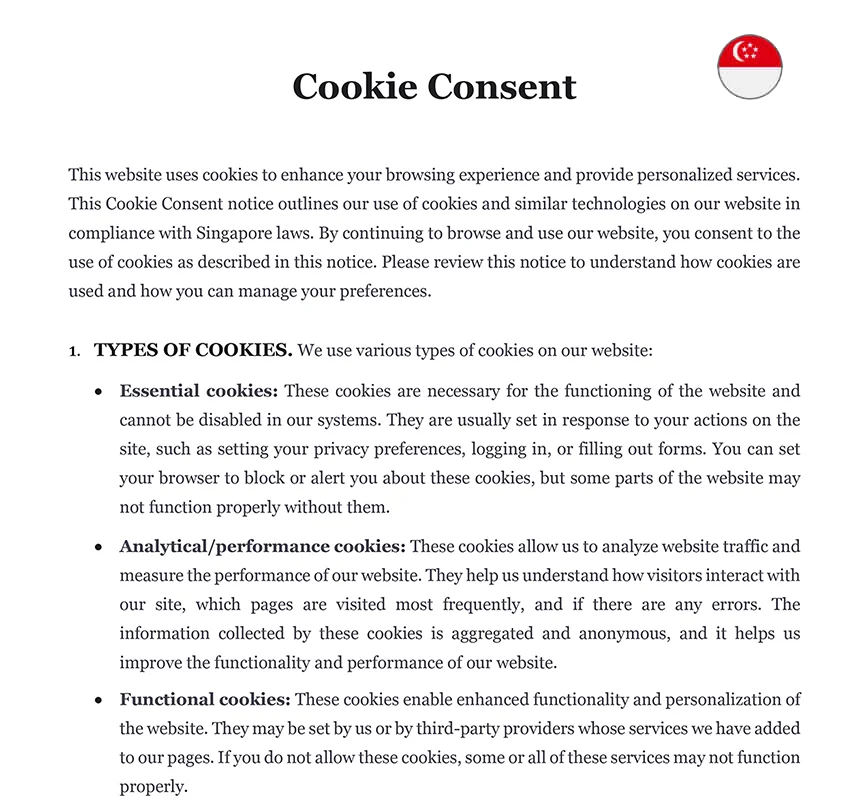Ready to use legal template
Drafted by experienced lawyers
Compliant with Singapore law
Ready to use legal template
Drafted by lawyers
Compliant with Singapore law
Home › Intellectual property › Cookie Consent
Learn more about website Cookie Consent in Singapore
Are you operating a website in Singapore? If so, it’s essential to understand and comply with the Cookie Consent Policy. In accordance with Singapore’s data protection laws, websites are required to obtain user consent before using cookies and tracking technologies that collect personal data. To ensure legal compliance and build trust with your users, consider utilizing Themis Partner’s easy-to-edit legal template. Designed by experienced lawyers familiar with Singapore’s data protection regulations, this template will help you draft a comprehensive and accurate Cookie Consent Policy for your website, safeguarding user privacy and enhancing your online presence.
Table of contents
What is a Cookie Consent Policy in Singapore?
Do I need a Cookie Consent Policy for my website?
What does website's Cookie Consent include?
Can I update my Cookie Consent Policy periodically?
How can I obtain user consent for cookies on my website?
What are the consequences of not having a Cookie Consent?
What is a Cookie Consent Policy in Singapore?
A Cookie Consent Policy in Singapore refers to a legal document that outlines how a website collects, uses, and manages cookies and similar tracking technologies that gather user data. In accordance with Singapore’s data protection laws, particularly the Personal Data Protection Act (PDPA), websites are required to obtain user consent before placing cookies or tracking technologies that collect personal data on a user’s device.
The Cookie Consent Policy should provide clear and transparent information to users about the types of cookies used, their purpose, and how they can give or withdraw consent. By implementing a Cookie Consent Policy, website operators demonstrate their commitment to safeguarding user privacy and complying with data protection regulations in Singapore.
Do I need a Cookie Consent Policy for my website?
Yes, if your website uses cookies or similar tracking technologies that collect personal data from users, you will likely need a Cookie Consent Policy. Implementing a Cookie Consent Policy is essential for compliance with data protection laws in many countries, including the European Union (EU) and Singapore.
In Singapore, the Personal Data Protection Act (PDPA) requires websites to obtain user consent before using cookies that collect personal data. The PDPA aims to protect individuals’ personal data and ensure that organizations handle such data responsibly.
Having a Cookie Consent Policy helps you inform users about the types of cookies used on your website, their purpose, and how users can give or withdraw consent. By obtaining explicit consent from users, you demonstrate transparency and respect for user privacy rights.
If your website is accessible to users from the EU or processes the data of EU residents, you may also need to comply with the General Data Protection Regulation (GDPR), which mandates explicit consent for cookie usage.
ℹ️ Overall, having a Cookie Consent Policy is not only a legal requirement in many jurisdictions but also a best practice to build trust with your users and ensure responsible data handling practices on your website.
What does website's Cookie Consent include?
A website’s Cookie Consent typically includes the following elements:
1. Description of Cookies
A clear explanation of what cookies are and how they function on the website.
2. Types of Cookies Used
A list of the different types of cookies used on the website, such as essential cookies, functional cookies, analytics cookies, advertising cookies, etc.
3. Purpose of Cookies
Information about the purpose of each type of cookie and how they contribute to the website’s functionality and user experience.
4. Data Collected by Cookies
Details about the data that cookies collect, which may include personal information and non-personal information.
5. User Consent
Clear instructions on how users can provide consent to the use of cookies, along with information on how they can withdraw their consent if they choose to do so.
6. Cookie Settings
If the website offers cookie settings or preference management options, a guide on how users can customize their cookie preferences.
7. Third-Party Cookies
Disclosure of any third-party cookies used on the website and information about the purposes of these cookies.
8. Cookie Duration
An explanation of how long each cookie will be stored on the user’s device before expiring.
9. Data Sharing
If cookies are used for tracking or advertising purposes, information on whether user data is shared with third parties and the purpose of such data sharing.
10. Cookie Policy Updates
A statement indicating that the Cookie Consent Policy may be updated from time to time and how users will be notified of any changes.
11. Links to Privacy Policy
A link to the website’s Privacy Policy, which provides more comprehensive information about data handling practices and user rights.
12. Age Restriction
If applicable, a statement that the website is not intended for children under a certain age and that cookies are not knowingly collected from minors.
- Remarks:
Including these elements in the Cookie Consent helps ensure transparency and compliance with data protection laws, such as the General Data Protection Regulation (GDPR) in the EU or the Personal Data Protection Act (PDPA) in Singapore. It allows users to make informed choices about their data privacy preferences while interacting with the website.
Can I update my Cookie Consent Policy periodically?
Yes, you can and should update your Cookie Consent Policy periodically. Regularly reviewing and updating your Cookie Consent Policy is essential to ensure that it remains accurate, compliant with the latest data protection laws, and reflects any changes in your website’s data processing practices. Several situations may prompt the need for updates to your Cookie Consent Policy:
| ➤ Changes in Cookie Usage: If you add new types of cookies or modify how existing cookies are used on your website, you should update your Cookie Consent Policy to inform users about these changes. |
| ➤ Legal Requirements: Data protection laws and regulations may evolve over time, and it's important to ensure that your Cookie Consent Policy is in line with the latest legal requirements in your jurisdiction. |
| ➤ Third-Party Services: If you integrate new third-party services or change your data sharing practices with external providers, your Cookie Consent Policy should be updated to reflect these arrangements. |
| ➤ User Feedback: If users provide feedback or raise concerns about your Cookie Consent Policy, consider addressing their feedback and making necessary updates. |
| ➤ Website Changes: Significant updates or changes to your website's functionality or design may impact the way cookies are used, requiring updates to your Cookie Consent Policy. |




